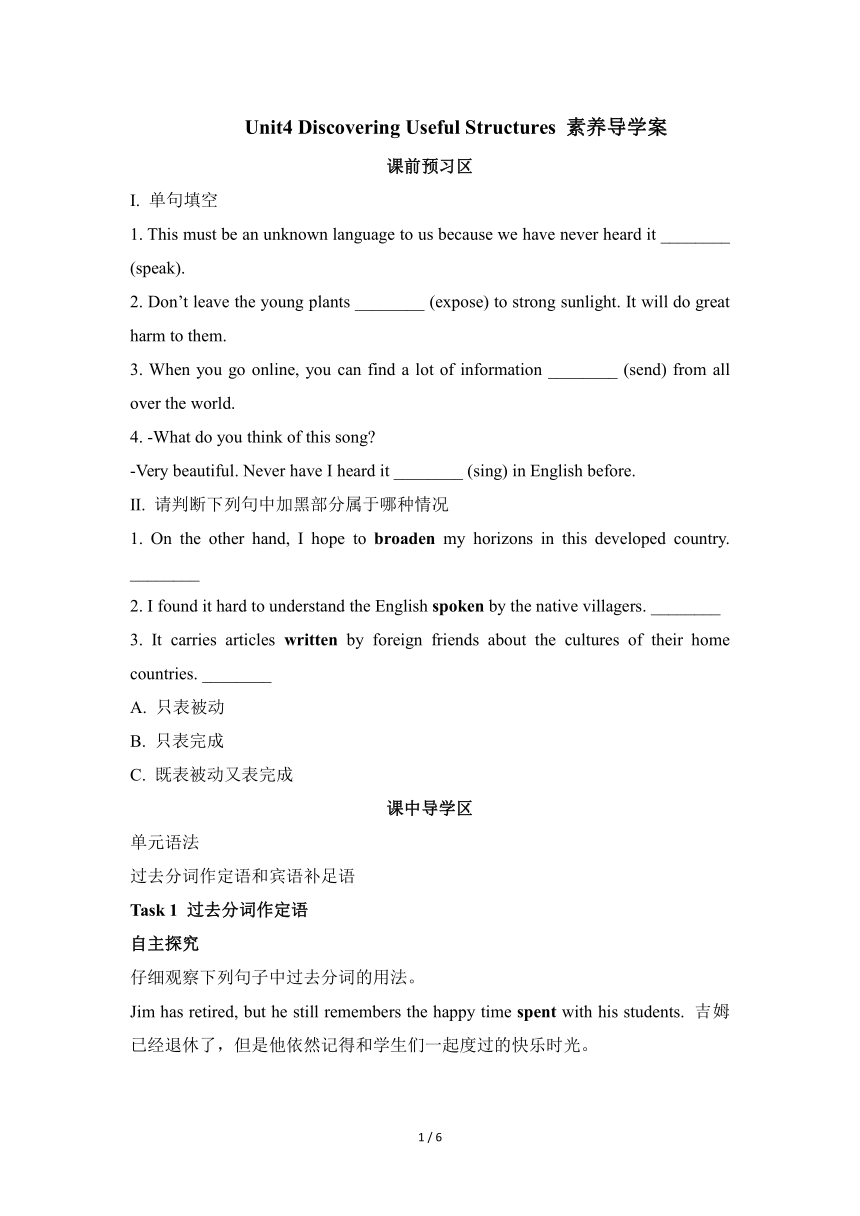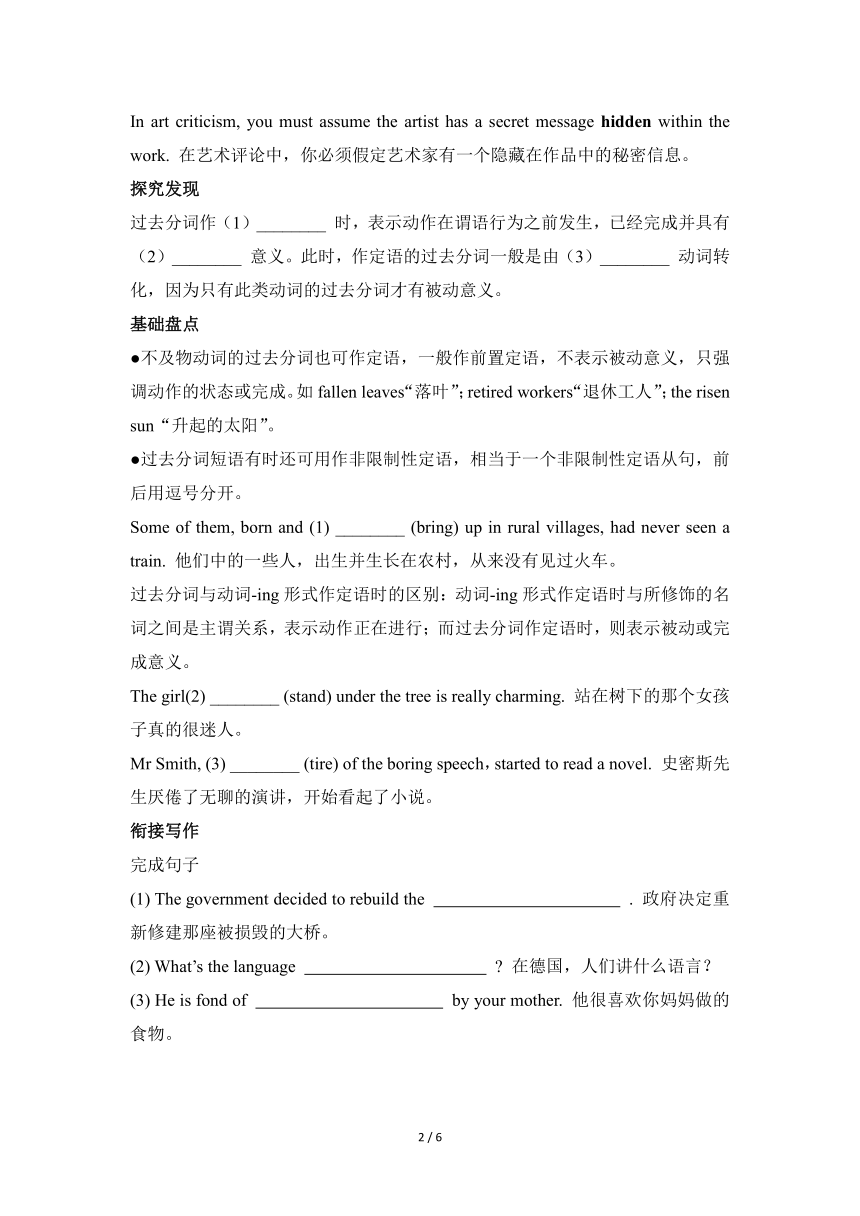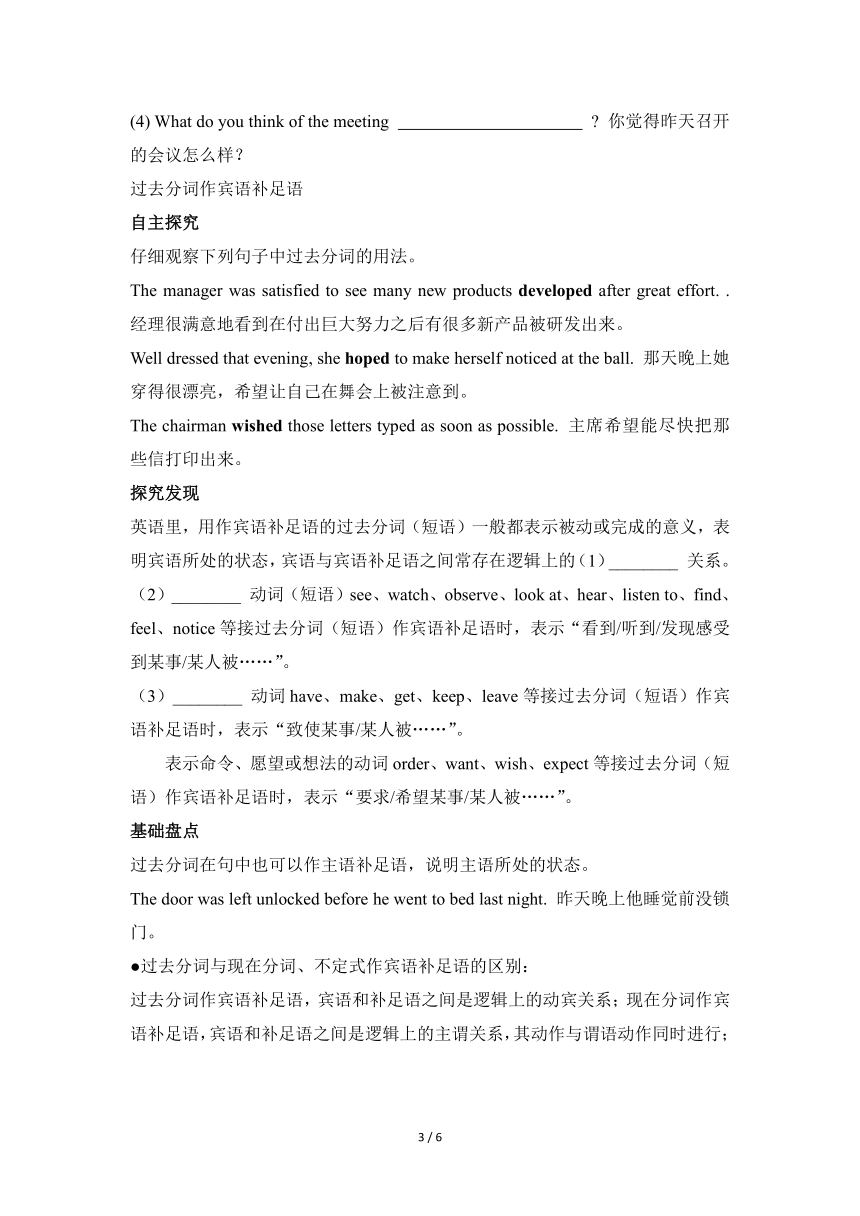人教版(2019)高中英语必修第二册 Unit4 History and traditions Discovering Useful Structures 素养导学案(有答案)
文档属性
| 名称 | 人教版(2019)高中英语必修第二册 Unit4 History and traditions Discovering Useful Structures 素养导学案(有答案) |  | |
| 格式 | docx | ||
| 文件大小 | 26.3KB | ||
| 资源类型 | 教案 | ||
| 版本资源 | 人教版(2019) | ||
| 科目 | 英语 | ||
| 更新时间 | 2023-03-09 22:42:19 | ||
图片预览



文档简介
Unit4 Discovering Useful Structures 素养导学案
课前预习区
I. 单句填空
1. This must be an unknown language to us because we have never heard it ________ (speak).
2. Don’t leave the young plants ________ (expose) to strong sunlight. It will do great harm to them.
3. When you go online, you can find a lot of information ________ (send) from all over the world.
4. -What do you think of this song
-Very beautiful. Never have I heard it ________ (sing) in English before.
Ⅱ. 请判断下列句中加黑部分属于哪种情况
1. On the other hand, I hope to broaden my horizons in this developed country. ________
2. I found it hard to understand the English spoken by the native villagers. ________
3. It carries articles written by foreign friends about the cultures of their home countries. ________
A. 只表被动
B. 只表完成
C. 既表被动又表完成
课中导学区
单元语法
过去分词作定语和宾语补足语
Task 1 过去分词作定语
自主探究
仔细观察下列句子中过去分词的用法。
Jim has retired, but he still remembers the happy time spent with his students. 吉姆已经退休了,但是他依然记得和学生们一起度过的快乐时光。
In art criticism, you must assume the artist has a secret message hidden within the work. 在艺术评论中,你必须假定艺术家有一个隐藏在作品中的秘密信息。
探究发现
过去分词作(1)________ 时,表示动作在谓语行为之前发生,已经完成并具有(2)________ 意义。此时,作定语的过去分词一般是由(3)________ 动词转化,因为只有此类动词的过去分词才有被动意义。
基础盘点
●不及物动词的过去分词也可作定语,一般作前置定语,不表示被动意义,只强调动作的状态或完成。如fallen leaves“落叶”;retired workers“退休工人”;the risen sun“升起的太阳”。
●过去分词短语有时还可用作非限制性定语,相当于一个非限制性定语从句,前后用逗号分开。
Some of them, born and (1) ________ (bring) up in rural villages, had never seen a train. 他们中的一些人,出生并生长在农村,从来没有见过火车。
过去分词与动词-ing形式作定语时的区别:动词-ing形式作定语时与所修饰的名词之间是主谓关系,表示动作正在进行;而过去分词作定语时,则表示被动或完成意义。
The girl(2) ________ (stand) under the tree is really charming. 站在树下的那个女孩子真的很迷人。
Mr Smith, (3) ________ (tire) of the boring speech,started to read a novel. 史密斯先生厌倦了无聊的演讲,开始看起了小说。
衔接写作
完成句子
(1) The government decided to rebuild the . 政府决定重新修建那座被损毁的大桥。
(2) What’s the language 在德国,人们讲什么语言?
(3) He is fond of by your mother. 他很喜欢你妈妈做的食物。
(4) What do you think of the meeting 你觉得昨天召开的会议怎么样?
过去分词作宾语补足语
自主探究
仔细观察下列句子中过去分词的用法。
The manager was satisfied to see many new products developed after great effort. . 经理很满意地看到在付出巨大努力之后有很多新产品被研发出来。
Well dressed that evening, she hoped to make herself noticed at the ball. 那天晚上她穿得很漂亮,希望让自己在舞会上被注意到。
The chairman wished those letters typed as soon as possible. 主席希望能尽快把那些信打印出来。
探究发现
英语里,用作宾语补足语的过去分词(短语)一般都表示被动或完成的意义,表明宾语所处的状态,宾语与宾语补足语之间常存在逻辑上的(1)________ 关系。
(2)________ 动词(短语)see、watch、observe、look at、hear、listen to、find、feel、notice等接过去分词(短语)作宾语补足语时,表示“看到/听到/发现感受到某事/某人被……”。
(3)________ 动词have、make、get、keep、leave等接过去分词(短语)作宾语补足语时,表示“致使某事/某人被……”。
表示命令、愿望或想法的动词order、want、wish、expect等接过去分词(短语)作宾语补足语时,表示“要求/希望某事/某人被……”。
基础盘点
过去分词在句中也可以作主语补足语,说明主语所处的状态。
The door was left unlocked before he went to bed last night. 昨天晚上他睡觉前没锁门。
●过去分词与现在分词、不定式作宾语补足语的区别:
过去分词作宾语补足语,宾语和补足语之间是逻辑上的动宾关系;现在分词作宾语补足语,宾语和补足语之间是逻辑上的主谓关系,其动作与谓语动作同时进行;不定式作宾语补足语强调动作发生的全过程,有时也表示一个将来的动作。注意:see、hear等动词后面作宾语补足语的不定式要省略to。
We saw the injured sent to hospital shortly after the accident. 我们看到在事故发生后,伤员很快被送到了医院。
We saw him cleaning the fallen leaves in the yard this morning. 今天早晨我们看见他在院子里扫落叶。
We saw her enter the supermarket and buy herself a box of chocolate. 我们看见她进了超市,给自己买了一盒巧克力。
变式训练
单句填空
(1) Tom has been away from home for two years, leaving his room ______ (cover) with dust.
(2) Why do you leave the baby ______ (cry) there
(3) I have to leave my house early ______ (catch) the early bus.
(4) A cook will be immediately fired if he is found ______ (smoke) in the kitchen.
(5) The managers discussed the plan that they would like to see ______ (carry) out the next year.
(6) She doesn’t want her daughter ______ (take) out after dark.
(7) When will you have your eyes ______ (examine)
(8) My mother got me ______ (check) all the homework I did last night.
(9) With the boy ______ (lead) the way, we will find the house easily tomorrow.
(10) I can hear the windows ______ (beat) by the heavy rain.
课堂思学区
夯实基础
I. 单句填空
l. The adobe dwellings(土坯房)______ (build) by the Pueblo Indians of the American Southwest are admired by architects and engineers.
2. The witnesses ______ (question) by the police just now gave very different descriptions.
3. I was the first Western TV reporter ______ (permit) to film a special unit caring for pandas rescued from starvation in the wild.
Ⅱ. 完成句子
1. I’ll about the breakthrough in our experiment. 我将向你报告有关我们实验的重要进展。
2. He woke up only to . 他醒来发现他的汽车被偷了。
3. You seldom hear rude words ______ in this ______ country. 在这个发达的国家里,你很少听到有人讲脏话。
4. He raised his voice so as to . 他提高嗓音以使别人能够听见他说话。
5. He left home in a hurry, ______ many things ______. 他匆忙离开家,留下很多事没做。
6. On his return, he was very ______ to find his room thoroughly ______ and everything ______ in order. 回来时,他很惊讶地发现房间被彻底地打扫了,一切都布置得井井有条。
7. I’ll tomorrow. 明天我将请人把门刷下油漆。
8. You’ll everywhere. 你会发现到处都在议论这个话题。
9. The book is said in his forties. 据说这本书是他在40多岁时写的。
10. On her way home from school, she was ______ to see a snake ______ to death by the road. 在放学回家途中,她非常恐惧地看到路边有一条被打死的蛇。
参考答案
课前预学区
I. 1. spoken 2. exposed 3. sent 4. sung
Ⅱ. 1. B 2. A 3. C
课中导学区
Task 1
探究发现(1)定语 (2)被动 (3)及物
基础盘点(1)brought (2)standing (3)tired
衔接写作(1)damaged bridge (2)spoken in Germany
(3)the food cooked (4)held yesterday
Task 2
探究发现(1)动宾 (2)感官 (3)使役
变式训练(1)covered (2)crying (3)to catch (4)smoking
(5)carried (6)taken (7)examined (8)to check
(9)to lead (10)beaten
课堂思学区
夯实基础
I. 1. built 2. questioned 3. permitted
II. 1. keep you informed 2. find his car stolen
3. spoken;developed 4. make himself heard
5. leaving;undone 6. surprised;cleaned;arranged
7. get/have my door painted 8. find the topic being discussed
9. to have been written 10. scared/frightened;beaten
课前预习区
I. 单句填空
1. This must be an unknown language to us because we have never heard it ________ (speak).
2. Don’t leave the young plants ________ (expose) to strong sunlight. It will do great harm to them.
3. When you go online, you can find a lot of information ________ (send) from all over the world.
4. -What do you think of this song
-Very beautiful. Never have I heard it ________ (sing) in English before.
Ⅱ. 请判断下列句中加黑部分属于哪种情况
1. On the other hand, I hope to broaden my horizons in this developed country. ________
2. I found it hard to understand the English spoken by the native villagers. ________
3. It carries articles written by foreign friends about the cultures of their home countries. ________
A. 只表被动
B. 只表完成
C. 既表被动又表完成
课中导学区
单元语法
过去分词作定语和宾语补足语
Task 1 过去分词作定语
自主探究
仔细观察下列句子中过去分词的用法。
Jim has retired, but he still remembers the happy time spent with his students. 吉姆已经退休了,但是他依然记得和学生们一起度过的快乐时光。
In art criticism, you must assume the artist has a secret message hidden within the work. 在艺术评论中,你必须假定艺术家有一个隐藏在作品中的秘密信息。
探究发现
过去分词作(1)________ 时,表示动作在谓语行为之前发生,已经完成并具有(2)________ 意义。此时,作定语的过去分词一般是由(3)________ 动词转化,因为只有此类动词的过去分词才有被动意义。
基础盘点
●不及物动词的过去分词也可作定语,一般作前置定语,不表示被动意义,只强调动作的状态或完成。如fallen leaves“落叶”;retired workers“退休工人”;the risen sun“升起的太阳”。
●过去分词短语有时还可用作非限制性定语,相当于一个非限制性定语从句,前后用逗号分开。
Some of them, born and (1) ________ (bring) up in rural villages, had never seen a train. 他们中的一些人,出生并生长在农村,从来没有见过火车。
过去分词与动词-ing形式作定语时的区别:动词-ing形式作定语时与所修饰的名词之间是主谓关系,表示动作正在进行;而过去分词作定语时,则表示被动或完成意义。
The girl(2) ________ (stand) under the tree is really charming. 站在树下的那个女孩子真的很迷人。
Mr Smith, (3) ________ (tire) of the boring speech,started to read a novel. 史密斯先生厌倦了无聊的演讲,开始看起了小说。
衔接写作
完成句子
(1) The government decided to rebuild the . 政府决定重新修建那座被损毁的大桥。
(2) What’s the language 在德国,人们讲什么语言?
(3) He is fond of by your mother. 他很喜欢你妈妈做的食物。
(4) What do you think of the meeting 你觉得昨天召开的会议怎么样?
过去分词作宾语补足语
自主探究
仔细观察下列句子中过去分词的用法。
The manager was satisfied to see many new products developed after great effort. . 经理很满意地看到在付出巨大努力之后有很多新产品被研发出来。
Well dressed that evening, she hoped to make herself noticed at the ball. 那天晚上她穿得很漂亮,希望让自己在舞会上被注意到。
The chairman wished those letters typed as soon as possible. 主席希望能尽快把那些信打印出来。
探究发现
英语里,用作宾语补足语的过去分词(短语)一般都表示被动或完成的意义,表明宾语所处的状态,宾语与宾语补足语之间常存在逻辑上的(1)________ 关系。
(2)________ 动词(短语)see、watch、observe、look at、hear、listen to、find、feel、notice等接过去分词(短语)作宾语补足语时,表示“看到/听到/发现感受到某事/某人被……”。
(3)________ 动词have、make、get、keep、leave等接过去分词(短语)作宾语补足语时,表示“致使某事/某人被……”。
表示命令、愿望或想法的动词order、want、wish、expect等接过去分词(短语)作宾语补足语时,表示“要求/希望某事/某人被……”。
基础盘点
过去分词在句中也可以作主语补足语,说明主语所处的状态。
The door was left unlocked before he went to bed last night. 昨天晚上他睡觉前没锁门。
●过去分词与现在分词、不定式作宾语补足语的区别:
过去分词作宾语补足语,宾语和补足语之间是逻辑上的动宾关系;现在分词作宾语补足语,宾语和补足语之间是逻辑上的主谓关系,其动作与谓语动作同时进行;不定式作宾语补足语强调动作发生的全过程,有时也表示一个将来的动作。注意:see、hear等动词后面作宾语补足语的不定式要省略to。
We saw the injured sent to hospital shortly after the accident. 我们看到在事故发生后,伤员很快被送到了医院。
We saw him cleaning the fallen leaves in the yard this morning. 今天早晨我们看见他在院子里扫落叶。
We saw her enter the supermarket and buy herself a box of chocolate. 我们看见她进了超市,给自己买了一盒巧克力。
变式训练
单句填空
(1) Tom has been away from home for two years, leaving his room ______ (cover) with dust.
(2) Why do you leave the baby ______ (cry) there
(3) I have to leave my house early ______ (catch) the early bus.
(4) A cook will be immediately fired if he is found ______ (smoke) in the kitchen.
(5) The managers discussed the plan that they would like to see ______ (carry) out the next year.
(6) She doesn’t want her daughter ______ (take) out after dark.
(7) When will you have your eyes ______ (examine)
(8) My mother got me ______ (check) all the homework I did last night.
(9) With the boy ______ (lead) the way, we will find the house easily tomorrow.
(10) I can hear the windows ______ (beat) by the heavy rain.
课堂思学区
夯实基础
I. 单句填空
l. The adobe dwellings(土坯房)______ (build) by the Pueblo Indians of the American Southwest are admired by architects and engineers.
2. The witnesses ______ (question) by the police just now gave very different descriptions.
3. I was the first Western TV reporter ______ (permit) to film a special unit caring for pandas rescued from starvation in the wild.
Ⅱ. 完成句子
1. I’ll about the breakthrough in our experiment. 我将向你报告有关我们实验的重要进展。
2. He woke up only to . 他醒来发现他的汽车被偷了。
3. You seldom hear rude words ______ in this ______ country. 在这个发达的国家里,你很少听到有人讲脏话。
4. He raised his voice so as to . 他提高嗓音以使别人能够听见他说话。
5. He left home in a hurry, ______ many things ______. 他匆忙离开家,留下很多事没做。
6. On his return, he was very ______ to find his room thoroughly ______ and everything ______ in order. 回来时,他很惊讶地发现房间被彻底地打扫了,一切都布置得井井有条。
7. I’ll tomorrow. 明天我将请人把门刷下油漆。
8. You’ll everywhere. 你会发现到处都在议论这个话题。
9. The book is said in his forties. 据说这本书是他在40多岁时写的。
10. On her way home from school, she was ______ to see a snake ______ to death by the road. 在放学回家途中,她非常恐惧地看到路边有一条被打死的蛇。
参考答案
课前预学区
I. 1. spoken 2. exposed 3. sent 4. sung
Ⅱ. 1. B 2. A 3. C
课中导学区
Task 1
探究发现(1)定语 (2)被动 (3)及物
基础盘点(1)brought (2)standing (3)tired
衔接写作(1)damaged bridge (2)spoken in Germany
(3)the food cooked (4)held yesterday
Task 2
探究发现(1)动宾 (2)感官 (3)使役
变式训练(1)covered (2)crying (3)to catch (4)smoking
(5)carried (6)taken (7)examined (8)to check
(9)to lead (10)beaten
课堂思学区
夯实基础
I. 1. built 2. questioned 3. permitted
II. 1. keep you informed 2. find his car stolen
3. spoken;developed 4. make himself heard
5. leaving;undone 6. surprised;cleaned;arranged
7. get/have my door painted 8. find the topic being discussed
9. to have been written 10. scared/frightened;beaten
